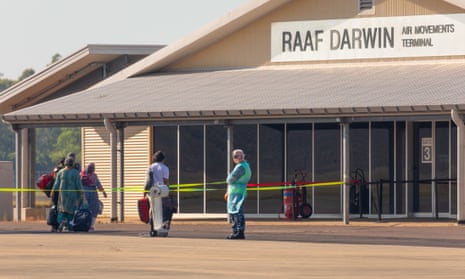Australians returning home from India on commercial flights – currently selling for more than $10,000 one-way – will not undergo the same strict pre-flight testing as those on government repatriation flights.
As a fresh row erupts between the Coalition and Labor over the handling of government-supported flights out of India, Guardian Australia has confirmed that those able to afford commercial flights are allowed to leave the country with just one of the two Covid tests that are required for vulnerable Australians supported to return home.
This is despite the prime minister, Scott Morrison, announcing last month that “passengers on all future flights will be required to have both a negative Covid-19 Polymerase Chain Reaction (PCR) test result and a negative Rapid Antigen test result prior to taking off.”
Following the lifting of the travel ban from the virus-ravaged country on Saturday, the government has begun repatriation flights to assist the 9,000 Australian Indians stuck in the country who have registered with the Department of Foreign Affairs and Trade to come home. About 900 of these are deemed vulnerable and are being prioritised for return.
On Saturday, 80 of 150 people booked on the first repatriation flight were able to board, after 40 people who tested positive pre-flight were barred from returning, along with about 30 of their close contacts. The 80 returnees are now in quarantine in the Howard Springs facility in the Northern Territory.
The ABC subsequently revealed that at least three Australians who were blocked due to positive tests later tested negative, sparking criticism that passengers were being unfairly blocked from returning and raising doubt about the testing regime.
Morrison said the government was working closely with Qantas on the “rigorous” testing regime, but indicated the process was being managed in a “difficult environment” by the airline, rather than the government.
The lifting of the travel ban has also seen indirect commercial flights resume from India, with Qatar Airways currently selling one-way tickets from various ports in India to Sydney, Melbourne, Adelaide, Brisbane and Perth, with an average ticket price of around $10,000 for a one-way fare.
Several travellers on the first commercial flights out of the country have reported through community Facebook groups that the Rapid Antigen test was not required to travel, with passengers transiting in Doha before flying to Australia.
The route via Doha was used by Australian cricketers to return home last month, sparking the controversial determination under the Biosecurity Act to criminalise travel to Australia of anyone who had been in India with the threat of five years in prison and hefty fines.
In April, the prime minister, Scott Morrison, said that the double testing regime was needed to ensure the government could keep the lid on infection rates in the hotel quarantine system, which was stretched to its limits by the large number of positive infections arising from returned travellers from India.
Travellers returning on commercial flights will be held in the state and territory hotel quarantine systems, whereas those returning on repatriation flights will stay at Howard Springs.
The next government-facilitated flight is expected to arrive in Darwin on 23 May, bringing up a total of 40 such flights since March 2020.
Following the testing debacle, the Labor leader, Anthony Albanese, accused Morrison of “passing off responsibility” to Qantas, and took aim at the government for failing to put in place an expanded federal quarantine system that would have capacity to manage Covid infections.
“In this case, he’s handed over quarantine responsibility to the states even though, clearly, it, according to the constitution, is the federal government’s responsibility,” Albanese said.
“He also, though, with regard to the people who’ve been stranded in India, is now blaming Qantas for the fact that people were offloaded from a flight they expected to get home on, but because of a false test are still stranded in India with all the risks of their health that it brings with it.
“Scott Morrison needs to take responsibility for something.”
The health minister, Greg Hunt, accused Albanese of wanting to bring Covid cases into Australia.
“We’ve identified a large number of positive cases before people were allowed to leave for Australia, that’s precisely what we should be doing,” Hunt said.
“What this process has done is it has prevented cases coming to Australia. If Mr Albanese wants to take a dangerous and irresponsible position and encourage the mass importation of positive Covid cases to Australia, he should be absolutely clear with the Australian people.”
As pressure builds on the government to ease travel restrictions and enhance the country’s quarantine capacity, Morrison on Monday also expressed government support for a Victorian proposal for a 500-bed cabin-style facility north of Melbourne, and for a separate plan to use facilities in the NT that are currently housing US marines.
However, he dismissed a plan for a privately-owned quarantine camp near Toowoomba, which would be owned by the Wagner family, saying the federal government had never received a proposal.
